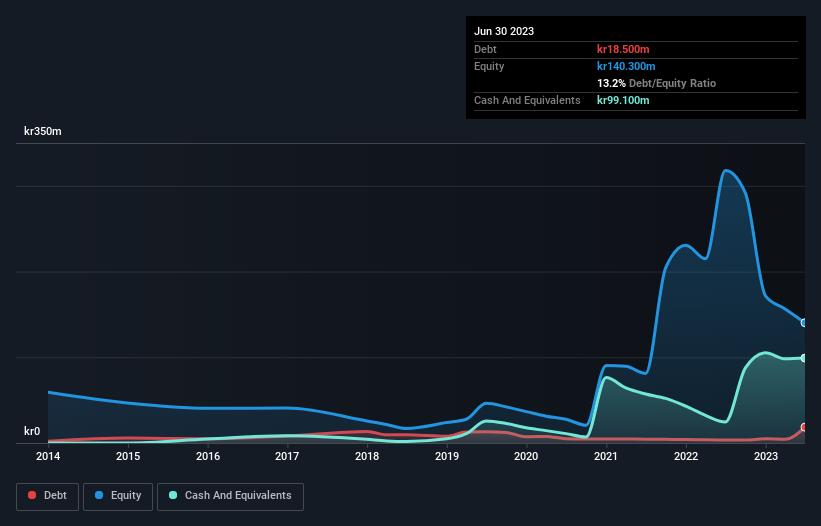
David Iben put it well when he said, 'Volatility is not a risk we care about. What we care about is avoiding the permanent loss of capital.' It's only natural to consider a company's balance sheet when you examine how risky it is, since debt is often involved when a business collapses. We note that Metacon AB (publ) (STO:META) does have debt on its balance sheet. But should shareholders be worried about its use of debt?
When Is Debt A Problem?
Debt and other liabilities become risky for a business when it cannot easily fulfill those obligations, either with free cash flow or by raising capital at an attractive price. Ultimately, if the company can't fulfill its legal obligations to repay debt, shareholders could walk away with nothing. However, a more frequent (but still costly) occurrence is where a company must issue shares at bargain-basement prices, permanently diluting shareholders, just to shore up its balance sheet. Of course, the upside of debt is that it often represents cheap capital, especially when it replaces dilution in a company with the ability to reinvest at high rates of return. When we think about a company's use of debt, we first look at cash and debt together.
See our latest analysis for Metacon
How Much Debt Does Metacon Carry?
As you can see below, at the end of June 2023, Metacon had kr18.5m of debt, up from kr3.57m a year ago. Click the image for more detail. However, its balance sheet shows it holds kr99.1m in cash, so it actually has kr80.6m net cash.

A Look At Metacon's Liabilities
The latest balance sheet data shows that Metacon had liabilities of kr38.9m due within a year, and liabilities of kr7.60m falling due after that. Offsetting these obligations, it had cash of kr99.1m as well as receivables valued at kr17.1m due within 12 months. So it actually has kr69.7m more liquid assets than total liabilities.
It's good to see that Metacon has plenty of liquidity on its balance sheet, suggesting conservative management of liabilities. Given it has easily adequate short term liquidity, we don't think it will have any issues with its lenders. Succinctly put, Metacon boasts net cash, so it's fair to say it does not have a heavy debt load! The balance sheet is clearly the area to focus on when you are analysing debt. But it is Metacon's earnings that will influence how the balance sheet holds up in the future. So if you're keen to discover more about its earnings, it might be worth checking out this graph of its long term earnings trend.
In the last year Metacon wasn't profitable at an EBIT level, but managed to grow its revenue by 67%, to kr71m. With any luck the company will be able to grow its way to profitability.
So How Risky Is Metacon?
Although Metacon had an earnings before interest and tax (EBIT) loss over the last twelve months, it generated positive free cash flow of kr75m. So although it is loss-making, it doesn't seem to have too much near-term balance sheet risk, keeping in mind the net cash. We think its revenue growth of 67% is a good sign. We'd see further strong growth as an optimistic indication. When analysing debt levels, the balance sheet is the obvious place to start. However, not all investment risk resides within the balance sheet - far from it. Be aware that Metacon is showing 2 warning signs in our investment analysis , and 1 of those makes us a bit uncomfortable...
If, after all that, you're more interested in a fast growing company with a rock-solid balance sheet, then check out our list of net cash growth stocks without delay.
New: Manage All Your Stock Portfolios in One Place
We've created the ultimate portfolio companion for stock investors, and it's free.
• Connect an unlimited number of Portfolios and see your total in one currency
• Be alerted to new Warning Signs or Risks via email or mobile
• Track the Fair Value of your stocks
Have feedback on this article? Concerned about the content? Get in touch with us directly. Alternatively, email editorial-team (at) simplywallst.com.
This article by Simply Wall St is general in nature. We provide commentary based on historical data and analyst forecasts only using an unbiased methodology and our articles are not intended to be financial advice. It does not constitute a recommendation to buy or sell any stock, and does not take account of your objectives, or your financial situation. We aim to bring you long-term focused analysis driven by fundamental data. Note that our analysis may not factor in the latest price-sensitive company announcements or qualitative material. Simply Wall St has no position in any stocks mentioned.
About OM:META
Metacon
Develops, manufactures, and sells energy systems to produce hydrogen, heat, and electricity.
Flawless balance sheet with high growth potential.
Market Insights
Community Narratives



